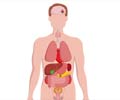Researchers at Johns Hopkins and Duke universities have linked mutations in two genes, IDH1 and IDH2, with the most common types of brain cancer and longer survival times.
The research team discovered variations in the IDH1 and IDH2 genes that are associated with three quarters of the most common types of cancer tumors, known as gliomas, according to the New England Journal of Medicine study.It is hoped the findings could open the way to more successful treatment of the disease.
To reach the conclusion, scientists say they looked for IDH1 and IDH2 gene alterations in material taken from 500 brain tumors and 500 non-central nervous system cancers.
They located changes in the IDH1 gene in more than 70 percent of three common types of gliomas: low-grade astrocytomas, oligodendrogliomas, and secondary glioblastomas. The changes occurred within a single spot along a string of thousands of genetic coding letters.
Some of the brain cancers that did not have alterations in IDH1 had equivalent mutations in another closely related gene, IDH2.
"For patients with these types of common brain tumors, mutations of IDH1/IDH2 are the most frequent genetic alterations yet identified," says D. Williams Parsons, M.D., Ph.D., visiting professor in pediatric oncology at Johns Hopkins and assistant professor at Baylor College of Medicine.
Advertisement
The median survival for glioblastoma patients with mutations in either IDH1 or IDH2 was 31 months versus 15 months for those lacking the mutations.
Advertisement
"Gliomas with IDH1/IDH2 mutations clearly make up a clinically and biologically distinct subgroup of brain cancers that may benefit from targeted therapies in the future," says Parsons.
Source-ANI
SRM












